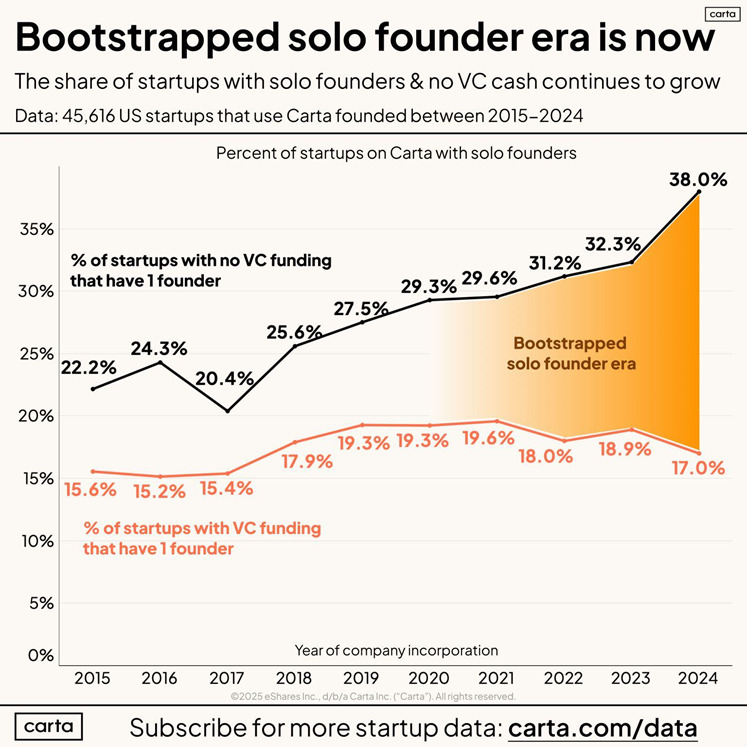
When you picture a startup, what comes to mind? A scrappy group of friends tinkering away in a garage, fueled by audacious dreams and cold pizza? While this romantic image of a collective entrepreneurial spirit persists, it doesn’t reflect the new reality. Increasingly, startups are being built not by teams, but by ambitious individuals who go it alone. In fact, 38% of bootstrapped startups in 2024 are driven by solo founders.

According to data from Carta, the share of start-ups with solo founders and no VC cash has steadily climbed from 22.2% in 2015 to a whopping 38% in 2024. It’s a clear signal: the bootstrapped solo founder era is here. Contrast this with start-ups that have raised venture capital, where solo founders are still the minority—17% in 2024. It’s not just about coffee and hustle. While research from CB Insights shows the lack of a strong team is a key reason for start-up failures, solo founders in bootstrapped businesses prove that personal resources, grit, and determination can go the distance. No venture capital, no safety net—just self-reliance and the relentless pursuit of a dream. If you’re ready to start your own venture but don’t have a co-founder, this blog will guide you on the path to success.
At Moonpreneur, we’re passionate about fostering entrepreneurial spirit from a young age. Our programs help you develop the skills needed to thrive as a solo founder. Register for a free trial today and take the first step toward building your bootstrapped future!
Why Are Solo Founders a Natural Fit for Bootstrapping?
Solo founders are like Swiss Army knives of entrepreneurship, tackling product development, marketing, customer support, and even accounting—all while riding the rollercoaster of running a business. Unlike venture-backed startups, where flashy metrics can overshadow meaningful impact, bootstrapped companies thrive only by solving real customer problems, as Jonny from Ticket Tailor aptly points out.
Bootstrapping means solving real pain points with real-world constraints. For solo founders, that constraint-heavy environment serves as a crucible to hone skills, focus strategy, and build sustainable businesses. Here’s why solo founders excel:
- Ultimate Decision-Making Power: You’re the captain of the ship. No debates, no diluting the vision—just clarity and execution.
- MacGyver-Level Resourcefulness: Who needs a co-founder when you can build a website, market it on a shoestring budget, and close your first deal—all before lunch?
- Focused Mission: As Basecamp’s founders say, great businesses say “no” more than they say “yes.” Solo founders wield laser focus without the distraction of competing visions.
As Zoom’s Founder and CEO reflects, going solo isn’t without challenges, but it can also accelerate decision-making and allow founders to stay laser-focused on their vision. He emphasizes, ‘When you’re a solo founder, speed is everything, and you can make decisions quickly, without waiting for co-founders.’
The Path of Most Resistance
Bootstrapping as a solo founder can feel like constructing a skyscraper with a single toolkit. Every resource has to stretch, every move has to count, and every hour feels like there aren’t enough of them in the day. But this path, while grueling, can also be immensely rewarding.
Take GoPro’s Nick Woodman as an example. Before his action cameras made him a millionaire, Woodman sold shell belts from a van to fund his venture. This bootstrapped hustle laid the foundation for what would become a billion-dollar business. Stories like his underscore a common truth: relentless execution beats unlimited resources.
Recommended Reading: Math and Coding: How Related are these Fields?
Lessons from Bootstrapped Solo Founders
Drawing insights from innovators across industries, let’s examine the critical strategies that help bootstrapped solo founders succeed:
1. Think Small, Act Boldly
Bootstrapping forces you to prioritize immediate impact over grandiose dreams. Jonny White (CEO) from Ticket Tailor emphasizes the value of simplicity, quoting Steve Jobs:
“Simple can be harder than complex. You have to work hard to get your thinking clean, to make it simple.”
Starting small doesn’t mean thinking small. Ship early, learn fast, and scale purposefully. Every small victory compounds into the foundation of a sustainable enterprise. Keith from Fern Creek Software sums it up best:
“Ship. Deliver for people. Shipping solves everything!”
2. The Cash Flow Commandment
As a solo founder, money is both your fuel and your lifeline. Unlike venture-backed businesses that burn investor capital, bootstrapped startups grow at the pace of their revenue. Markus Frind, the solo founder behind Plenty of Fish, built a profitable business out of his apartment, keeping costs low and efficiency high.
To master the art of cash flow management:
- Be Frugal: Borrow a page from Rohit Datta (Co-Founder) at Formspree, who built developer tools with simplicity and efficiency in mind, avoiding unnecessary expenses.
- Get Creative: Automation tools and DIY solutions are a bootstrapped founder’s best friends.
Remember, the leaner you are, the more agile you remain.
3. Leverage Sweat Equity
In the absence of capital, your work ethic is your currency. Guido Zuidhof (Co-founder/CTO) from Friendly Captcha champions a long-term mindset:
“Do one thing and do it better than anyone else. Build a business first, ‘tech startup’ second.”
Sweat equity isn’t just about hustle; it’s about being relentless in value creation while staying smart with your energy. Rohit Datta points out how founders with hands-on expertise can solve critical problems, like Formspree’s React library that improves developer experience—a solution born from solving their own frustrations.
4. Outsource Selectively
Being a solo founder doesn’t mean you have to do it all. Scaling becomes nearly impossible if you spread yourself too thin. As Alex Kotliarskyi (Co-Founder & CTO) from Secta Labs notes:
“You have to be pragmatic. Rely on third-party infrastructure and tools to lighten the load.”
When deciding where to outsource, focus on:
- High-ROI Tasks: Delegate repetitive or specialized tasks like bookkeeping or paid ad management.
Tools Over Teams: Invest in affordable SaaS platforms to automate workflows and enhance efficiency.
5. Cultivate a Tribe of Evangelists
In a bootstrapped business, your customers are your investors. Building a loyal user base isn’t just a growth strategy; it’s your competitive moat. Secta AI, for instance, ensures a “wow” experience with every interaction. This kind of customer-centric thinking drives organic word-of-mouth growth—a priceless advantage for resource-starved founders.
6. The Emotional Cost of Flying Solo
Let’s be honest: being a solo founder isn’t all triumphs and ticker-tape parades. The mental and emotional load can be crushing. You’re responsible not just for the business’s survival, but also for navigating every failure and setback along the way. Jonny at Ticket Tailor captures this well:
“Running my own company takes up a lot of headspace. It impacts the quality of my personal life, especially with young kids. I’m trying to address this.”
To manage the weight:
- Set Boundaries: Schedule time for personal pursuits, even if it’s a short daily meditation or coffee break.
- Build a Support Network: Connect with other solo founders to share insights, challenges, and victories.
7. Highs, Lows, and Why It’s Worth It
While flying solo comes with its share of turbulence, the freedom, control, and deep sense of accomplishment make it worthwhile. As Marko from Secta AI puts it:
“Bootstrapping feels grounded. You’re not running on future promises—you’re creating value that’s real, here, and now.”
Here’s the trade-off:
- The Highs: You retain complete ownership. Flexible growth aligns with your values, not investor demands. A lean model sets a foundation for stability, even in economic downturns.
- The Lows: Decision-making fatigue can creep in. Scaling gets complicated without a broader team. Lacking co-founders means limited expertise to rely on.
Cultivating the Next Generation of Bootstrapped Entrepreneurs
At Moonpreneur, we’re dedicated to fostering entrepreneurial mindsets in young innovators, empowering them to pursue their ventures with a bootstrapped approach. Through initiatives like the MoonBattle Conference, we offer aspiring young entrepreneurs a platform to present their ideas, connect with mentors, and get a taste of real-world challenges. This event is just one part of our broader mission to nurture the next generation of resourceful, self-starting business leaders.
Moonpreneur’s programs equip young talent with the tools to succeed in the world of bootstrapped ventures—teaching creativity, financial management, and resilience early on. Whether through product development or learning the art of resourceful growth, we’re laying the foundation for entrepreneurial success. Interested? Register for a free trial today and join the movement!
A Parting Note for Aspiring Founders
Bootstrapping as a solo founder isn’t for the faint-hearted, but if you’re driven by a clear vision, it can be profoundly rewarding. Whether you’re breaking into edtech, dev tools, or consumer products, focus on what Jonny, Guido, and Rohit all stress: keep it simple, build sustainably, and stay close to your customers.
Like pulling yourself up by your own bootstraps, starting alone can feel daunting. But as countless solo founders have proven, this journey is entirely worth the effort—one bold, resourceful step at a time.
Moonpreneur is on a mission to disrupt traditional education and future-proof the next generation with holistic learning solutions. Its Innovator Program is building tomorrow’s workforce by training students in AI/ML, Robotics, Coding, IoT, and Apps, enabling entrepreneurship through experiential learning.

























